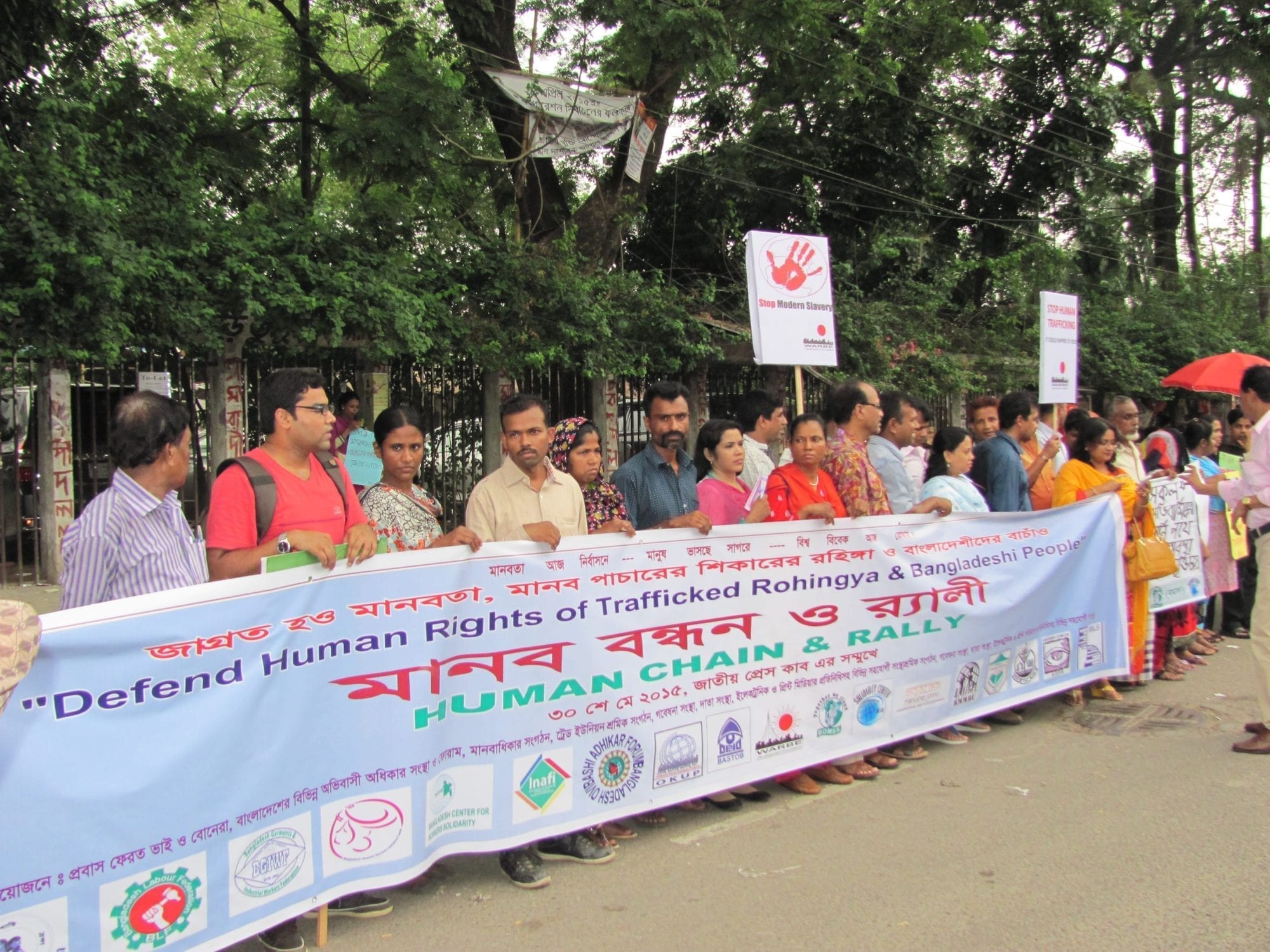
Jun 5, 2015
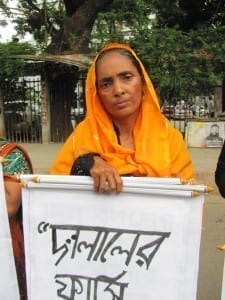
Selina Begum’s son has been missing at sea since he migrated for work. Credit: Solidarity Center/Mushfique Wadud
Selina Begum, 60, traveled from Bangladesh’s northeast Narshindi district to Dhaka, the capital, for one reason, she says: “I want to know the whereabouts of my son.”
Selina’s son, Taizul Islam Rakib, 22, is among the thousands of workers and their families who have migrated overseas to find jobs. Selina says she glimpsed her son in a television news story on the plight of migrants abandoned on boats, but has not heard from him.
Over the weekend, Selina joined dozens of those with missing loved ones in a human chain in downtown Dhaka, where they carried signs, “Punish the trafficking traders,” and held a press conference demanding the government take action. They were joined by repatriated victims of human trafficking like Abdur Rahman, 40, who was rescued from Malaysia and returned to Bangladesh.
“I did not get anything to eat for 22 days and just survived by eating tree leaves,” Abdur said, describing his journey to Malaysia.” “I never thought I would survive.”
Fulmoti, 35, has been waiting for a phone call from her husband Faruk Hossain, 40, who set out for Malaysia by sea on April 14. “My morning starts with the hope that my husband would phone me, but every night I go to bed feeling hopeless,” says Fulmoti, a mother of two.
The event was organized by 19 labor and human rights organizations, including the Solidarity Center and its allies, the Bangladesh Center for Workers Solidarity (BCWS), the Bangladesh Garment and Industrial Workers Federation (BGIWF) and the Bangladesh Independent Garment Workers Union Federation (BIGUF). The coalition issued a joint statement urging governments in origin and destination countries to take immediate action to repatriate migrants and punish traffickers.
Speaking at the event, Syed Saiful Haque, chairman of WARBE Development Foundation, a Bangladesh emigrant rights group, said that the immediate repatriation of trafficking victims should be governments’ first priority. In addition, said Syed Sultan Uddin Ahmmed, assistant executive director of the Bangladesh Institute of Labor Studies, the government must take action against the leaders of trafficking chains.
The event stems from a decision by members of WARBE, the Bangladeshi Ovhibashi Mohila Sramik Association (BOMSA) and Solidarity Center to work together in raising the issue of trafficked migrants. The group is asking the Bangladesh government to take steps to repatriate trafficking victims and rehabilitate them; demanding prosecution of traffickers; and urging the government to work with other concerned governments to prevent stop criminal trafficking.
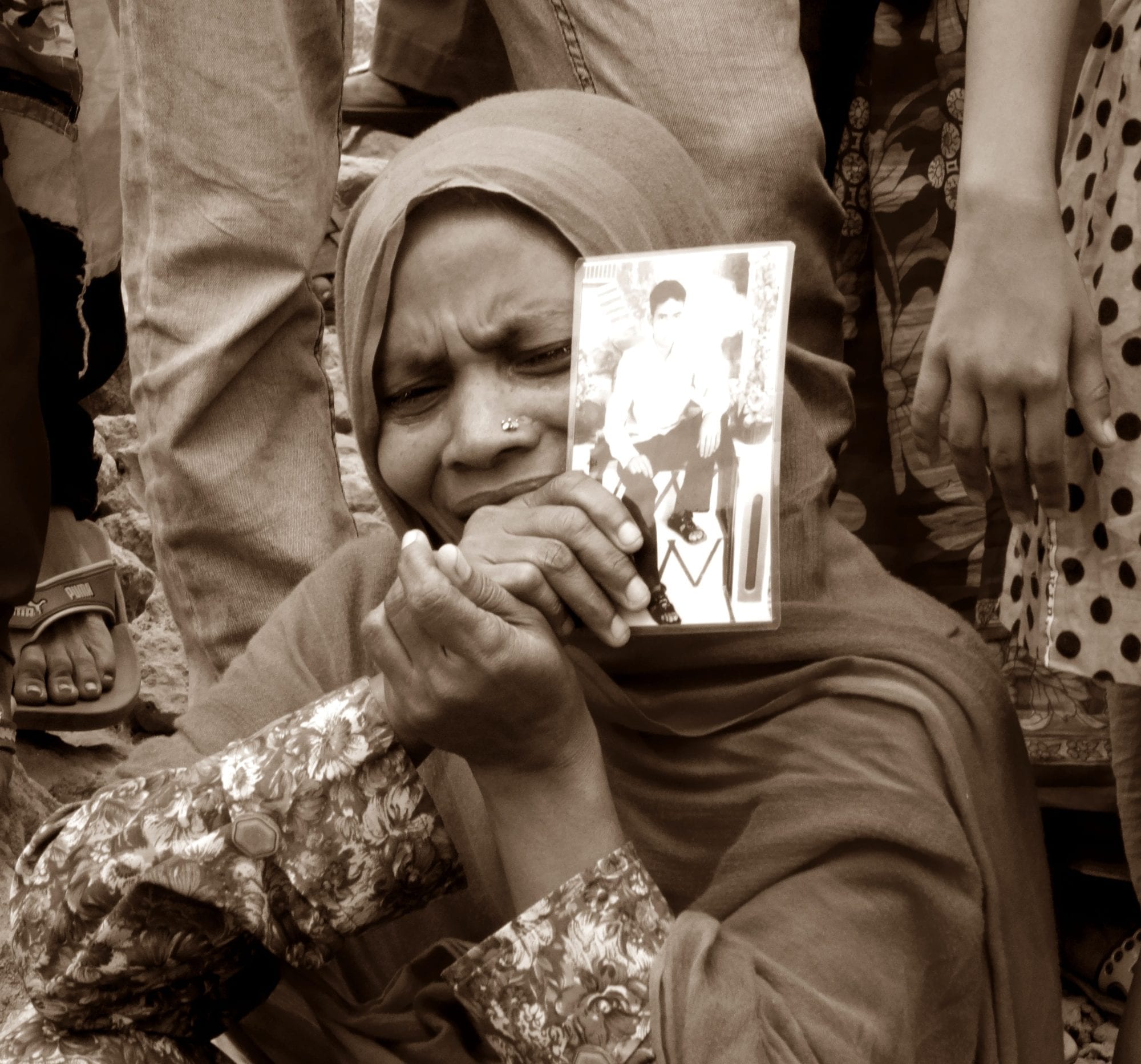
Jun 2, 2015
Reports that at least 41 government officials have been charged in the deadly 2013 collapse of Rana Plaza in Bangladesh “represent a long-delayed step toward justice,” says Solidarity Center Asia Regional Program Director Tim Ryan.
“Finally, after more than two years, the Bangladesh government is moving toward holding accountable those who were responsible for the deaths and injuries of hundreds of women and men toiling for pennies in those five garment factories,” Ryan says. “Rana Plaza was the Bangladesh’s worst-ever industrial disaster, and ensuring the justice process works is the absolute minimum the government can do for those who lost loved ones or were injured in the Rana Plaza disaster.”
Sohel Rana, the owner of the building; his parents, the owners of several factories in the building; and at least a dozen government officials were formally charged yesterday, according to the New York Times, citing a state prosecutor, Anwarul Kabir, who is part of the legal team that will pursue the case. At least 17 individuals have been charged with murder, while others face lesser charges, like violating building codes.
More than 1,100 garment workers, mostly women, were killed when the multistory Rana Plaza building pancaked on April 24, 2013. Thousands more were severely injured, many of them now unable to work and support their families. The building housed five garment factories.
A Bangladesh government inquiry in May 2013 concluded that substandard construction materials and the vibration of heavy machinery in the five garment factories were prime triggers of the building’s collapse. Sohel Rana, a prominent leader in the nation’s ruling party, was arrested shortly after over the disaster as he tried to flee to India.
A structural engineer inspecting the building the day before it collapsed found structural cracks, and retail workers in the building were told to stay home. Despite the engineer’s warnings, Rana told factory operators the building was safe. Factory owners then demanded workers return the next day and work; some were threatened with the loss of a month’s pay if they did not go back to the factory floor.
If convicted, the accused could face the death penalty, according to the New York Times, citing Bijoy Krishna Kar, the investigating officer who filed the charges on Monday.
Bangladesh garment factories are notoriously unsafe. Although Rana Plaza served as wake-up call to authorities, factory owners and Western brands, who are now taking steps to remedy the situation, workers still are injured or die on the job. According to data gathered by the Solidarity Center in Bangladesh since November 2012, the garment sector has seen at least 84 fire incidents injuring more than 900 workers and killing more than 31 workers.
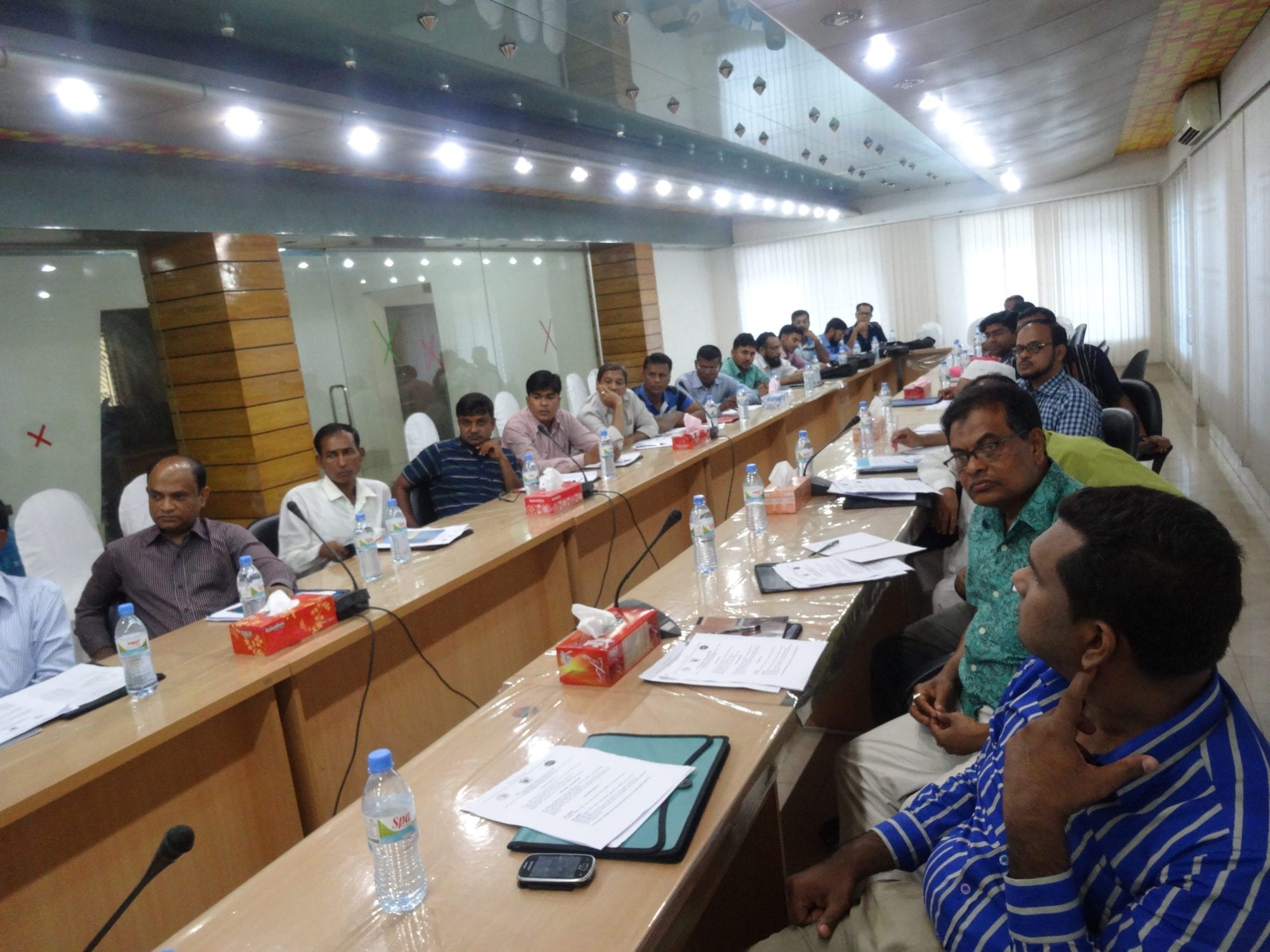
May 14, 2015
Bangladesh shrimp industry owners, management officials and labor and human rights activists discussed and debated the dispute resolution process in the country’s shrimp industry at a recent workshop organized by the Solidarity Center, the Bangladesh Frozen Foods Exporters Association (BFFEA) and Bangladesh Shrimp and Fish Foundation (BSFF).
The alternative dispute resolution process was instigated in 2013 when BFFEA, BSFF and the Solidarity Center signed a groundbreaking memorandum of agreement (MoA).
Under the MoA, shrimp industry owners and managers agreed to implement worker rights according to Bangladesh labor law and International Labor Organization (ILO) core labor standards and to give the nearly 1 million shrimp workers who toil during peak season across the supply chain the right to form trade unions.
Among the participants, who included production managers, compliance officers and managing directors, BFFEA Senior Vice President Golam Mostafa said he hoped the dispute resolution mechanism in the shrimp industry would be an example other industries will follow. Solidarity Center-Bangladesh’s MoA project consultant and former secretary of Bangladesh government AKM Zafar Ullah Khan said that alternative dispute resolution and participation committee is important for a sustainable shrimp sector.
Solidarity Center’s Bangladesh staff also addressed questions about pending cases, worker compensation and the overall process.
Alonzo Suson, Solidarity Center Bangladesh country program director, stressed the need for promotion, outreach and education to make workers aware of the alternative dispute resolution process. Suson praised the MoA and said he had heard that labor-management relationships were improving because of the joint initiative.
The Solidarity Center began working with Bangladeshi nongovernmental organizations in 2005 to look at ways to ensure the rights of shrimp workers are protected at the workplace. In 2012, the Solidarity Center issued its second in-depth report on the issue, “The Plight of Shrimp-Processing Workers of Southwestern Bangladesh.”
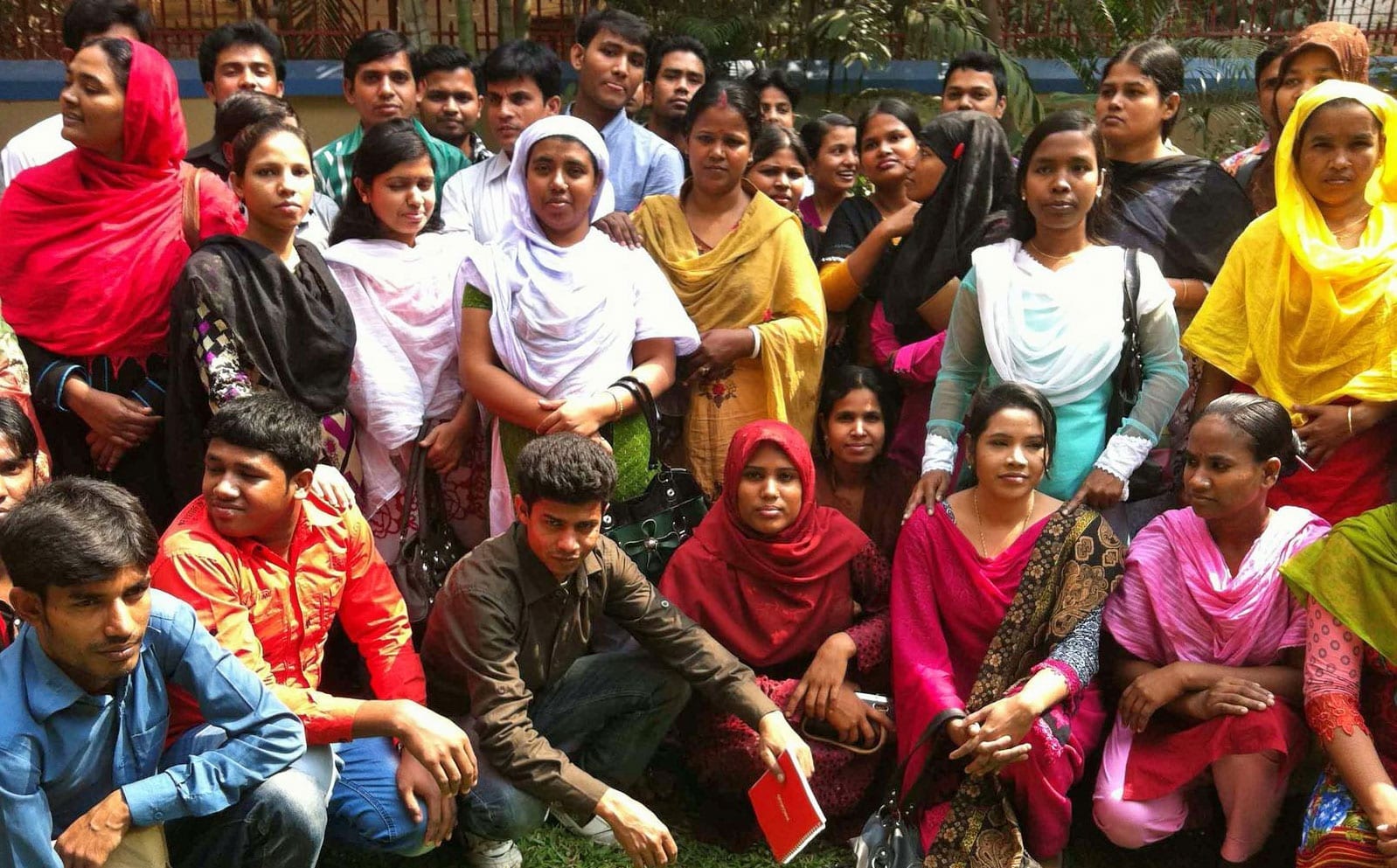
May 13, 2015
When a garment factory union organizer in Gazipur, Bangladesh, was beaten in April while meeting with workers about their nascent union, the Solidarity Center Bangladesh Worker Rights Defense Fund was there to help him cover the medical care he needed, an expense he otherwise could not have afforded.
The Solidarity Center launched the Bangladesh Worker Rights Defense Fund in April 2014, following an increase in violence and harassment against workers, many of them young women, who were seeking to form unions to protect their health, dignity and rights on the job. Donations of more than $15,500 over the last year from individuals and organizations have helped to provide costly medical treatment for organizers beaten or attacked while speaking to workers about their rights, and temporary food and shelter for workers fired for trying to improve their workplace.
Following the Rana Plaza collapse in April 2013 and other high-profile catastrophes, the Bangladesh government began recognizing worker rights and the country’s own labor laws, allowing workers to form representative unions. Garment workers have since established more than 300 factory-level unions and seen more than 15 collective bargaining agreements signed.
But in the past year, violence and retaliation against workers seeking safe workplaces, protection from sexual harassment and better-than-subsistence-level wages has escalated. “A severe climate of anti-union violence and impunity prevails in Bangladesh’s garment industry,” according to a March International Trade Union Confederation (ITUC) report. “The violence is frequently directed by factory management.”
When garment workers are allowed to form unions, they have the opportunity to create positive changes at their workplaces.
There’s still time to donate to the Bangladesh Worker Rights Defense Fund.
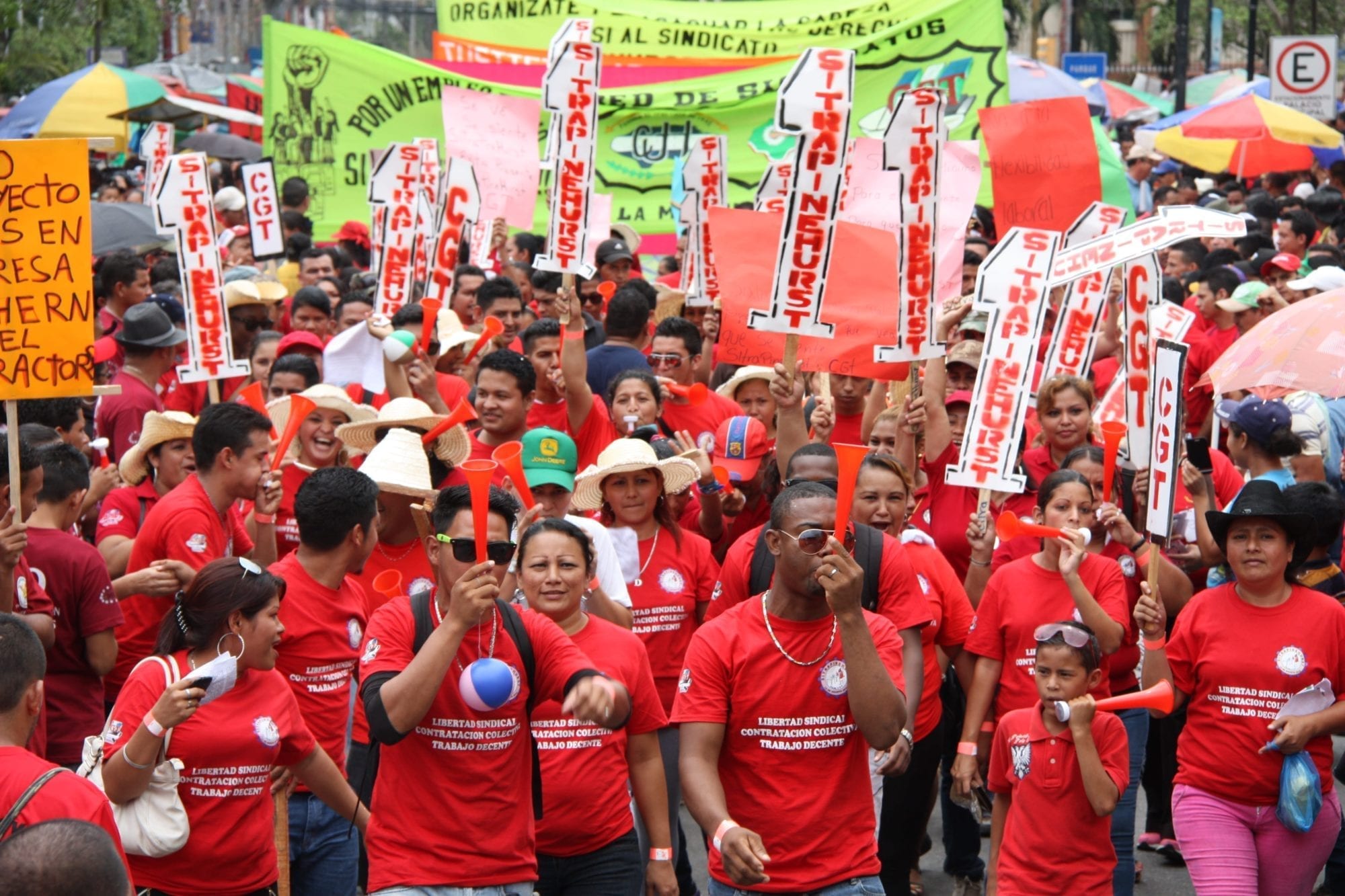
May 5, 2015
Hundreds of thousands of workers and their unions around the world marked International Workers Day May 1. For many, the day provided a time to push for living wages and safe workplaces. Yet this year, governments in some countries like Bahrain and Swaziland banned May Day celebrations or threatened workers with retaliation if they turned out—and some brave workers defied these edicts to exercise their freedom to gather in public spaces.
Elsewhere, workers like those in Bangladesh who often are prevented from forming unions or exercising their fundamental worker rights, called for the freedom to join unions and correct workplace injustices.
Sumi Begum, 25, a Bangladeshi garment worker, says that she and other workers at her factory have not received salaries or overtime pay for the past two months, but they cannot raise the issue with the manager because they fear they would be terminated if they did so.
“Garment factories that have union are not facing these kinds of problems,” she says. “The condition of those garment industries is much better than ours.”
[portfolio_slideshow id=4427]






